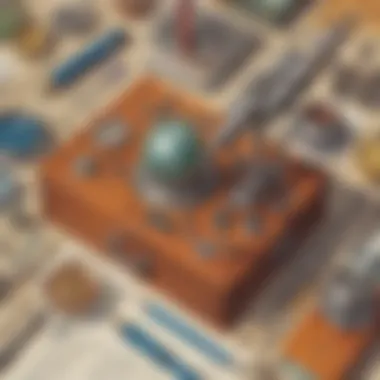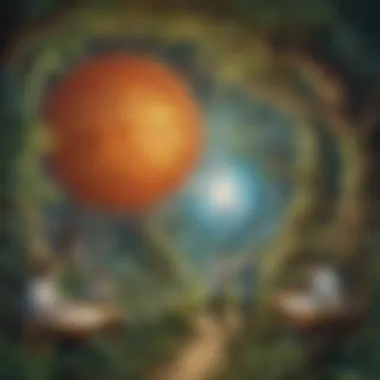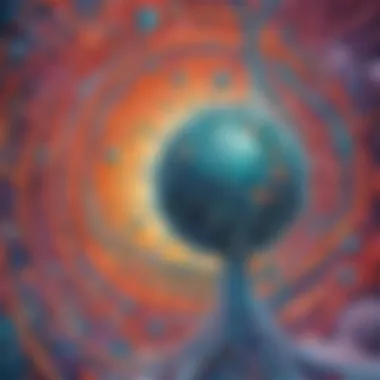Unleashing the Wonders of Experimental Science: A Guide for Young Science Enthusiasts


Science Fun Facts
Have you ever wondered how a butterfly tastes its food? It uses its feet! Yes, butterflies taste with their feet, and each leg has taste sensors to help them find their favorite plants. Isn't nature fascinating? Another fun fact is that the Sun is actually white, not yellow. It only appears yellow to us because of the Earth's atmosphere. Science is full of intriguing trivia and incredible stories waiting to be discovered!
Discover the Wonders of Science
Today, we embark on a journey to unravel the mysteries of the scientific world. From understanding the principles of gravity to witnessing the power of electricity, each concept introduces us to the marvels of the universe. Educational videos and interactive tools enhance our learning experience, making complex theories come alive before our eyes. Science isn't just a subject; it's a boundless realm of knowledge waiting to be explored!
Science Quiz Time
Are you ready to put your scientific knowledge to the test? Engage in interactive quizzes and solve brain teasers that challenge your critical thinking skills. From exploring the depths of the ocean to unraveling the secrets of outer space, each question stimulates our curiosity and expands our understanding of the natural world. Learning is not just about memorization; it's about embracing the thrill of discovery!
Science Experiment Showcase
Get ready to roll up your sleeves and dive into the world of experimentation! With fun and engaging experiments, you'll witness scientific concepts come to life right before your eyes. Follow step-by-step instructions, gather your materials, and remember to prioritize safety at all times. From creating erupting volcanoes to exploring the principles of light, each experiment is a gateway to hands-on learning and excitement.
Introduction to Experimental Science
Experimental science is a gateway to unlocking the mysteries of the natural world, designed specifically to ignite the curiosity and intellect of young science enthusiasts aged 6-12. This section provides a foundational overview of experimental methodologies, from the essence of scientific inquiry to the hands-on exploration that defines the scientific process.
Understanding the Fundamentals
When we delve into the core of experimental science, we encounter a realm defined by its commitment to empirical investigation, tangible evidence, and logical reasoning. Experimental science at its essence involves formulating hypotheses, conducting systematic observations, and drawing conclusions based on factual data. The section on Understanding the Fundamentals aims to equip young minds with the essential tools to navigate through the intricate landscape of experimental science.
Defining Experimental Science
At the heart of every scientific endeavor lies the essence of defining experimental science. This segment elucidates the intricacies of experimental science, emphasizing the significance of controlled experimentation in validating scientific theories. By delving into the specifics of experimental design, variables, and data interpretation, young learners can grasp the fundamental principles underlying scientific inquiry. Notably, defining experimental science cultivates a sense of empirical rigor and critical thinking essential for aspiring young scientists.
Role of Experiments in Science
The role of experiments in science transcends mere observation, serving as the cornerstone of empirical validation and knowledge expansion. This subsection explores how experiments contribute to the advancement of scientific knowledge by testing hypotheses, verifying predictions, and uncovering new phenomena. By immersing themselves in hands-on experimentation, young science enthusiasts develop a deeper appreciation for the iterative nature of scientific discovery, fostering a spirit of curiosity and exploration.
Importance of Observation
Observation stands as the pillar of empirical research, guiding scientists in data collection, pattern recognition, and hypothesis formulation. This segment underscores the critical role of observation in experimental science, emphasizing its relevance in drawing meaningful conclusions from experimental data. By honing their observational skills, young scientists can unravel the intricacies of the natural world, laying the groundwork for future scientific endeavors.
Exploring Different Branches
From the realms of physics to chemistry and biology, the world of experimental science abounds with diverse branches waiting to be explored. Each branch presents unique challenges, phenomena, and insights, offering young enthusiasts a multidimensional perspective on the natural sciences. This section delves into the nuances of physics experiments, chemistry experiments, and biology experiments, elucidating the distinct characteristics and methodologies that define each discipline.
Physics Experiments
Physics experiments delve into the fundamental laws and principles governing the physical world around us. By engaging in physics experiments, young learners uncover the mysteries of motion, energy, and forces, cultivating a deeper understanding of the universe's underlying mechanisms. Through hands-on exploration of concepts like gravity, magnetism, and light, budding physicists embark on a journey of discovery and enlightenment.
Chemistry Experiments
The realm of chemistry experiments unveils the enigmatic world of atoms, molecules, and chemical reactions, sparking curiosity and intrigue in young minds. Through engaging in chemistry experiments, aspiring chemists delve into the realm of acids, bases, and compounds, unraveling the mysteries of molecular interactions and elemental transformations. By engaging with chemical phenomena firsthand, young scientists hone their analytical skills and scientific intuition, laying a solid foundation for future explorations in chemistry.


Biology Experiments
Embark on a captivating journey into the realm of biology experiments, where the intricacies of life processes, ecosystems, and organisms come to life through scientific inquiry. By immersing themselves in biology experiments, young biologists unravel the complexities of the natural world, exploring topics such as genetics, ecology, and human anatomy. Through hands-on investigation and observation, budding biologists cultivate a profound appreciation for the diversity and interconnectedness of living organisms, nurturing a passion for biological discovery.
Tools and Equipment
As young scientists embark on their experimental endeavors, equipping them with the necessary tools and equipment becomes paramount. This section delves into the essential instruments and safety gear required for conducting experiments, ensuring a safe and productive scientific learning environment.
Common Laboratory Tools
Common laboratory tools serve as the backbone of experimental science, enabling young scientists to conduct precise measurements, perform controlled experiments, and analyze data effectively. This subsection outlines the significance of essential tools such as beakers, test tubes, and microscopes in facilitating scientific exploration, emphasizing the importance of proper instrument utilization and maintenance.
Safety Equipment in Experiments
Safety remains a top priority in experimental science, underscoring the importance of protecting young scientists from potential hazards and accidents in the laboratory setting. By acquainting themselves with safety equipment such as goggles, gloves, and aprons, young learners cultivate a culture of caution and responsibility, ensuring their well-being and the integrity of their scientific investigations.
Innovative Experiment Kits
Innovative experiment kits epitomize the fusion of education and entertainment, offering young scientists a hands-on approach to exploring scientific concepts in a dynamic and engaging manner. This section explores the benefits of utilizing experiment kits that provide pre-packaged materials, step-by-step instructions, and interactive elements to enhance the learning experience. By experimenting with innovative kits on topics ranging from robotics to environmental science, young enthusiasts can nurture their scientific curiosity and creativity, paving the way for future scientific exploration and discovery.
Getting Hands-on with Experiments
Setting Up Your Experiment
Creating a Hypothesis
The process of Creating a Hypothesis is essential as it helps young scientists formulate a prediction based on their observations and prior knowledge. By defining a clear hypothesis, children can establish a framework for their experiments, test their assumptions, and draw meaningful conclusions. This analytical approach promotes logical thinking, encourages students to make educated guesses, and emphasizes the significance of hypothesis testing in scientific investigations.
Gathering Materials
Gathering Materials is a vital aspect of conducting experiments as it ensures that young scientists have all the necessary resources to carry out their investigations effectively. By carefully selecting and organizing materials, children learn the importance of preparation, planning, and following experimental procedures. This step instills a sense of responsibility, attention to detail, and the value of resource management in scientific endeavors.
Step-by-Step Procedure
The Step-by-Step Procedure provides a structured framework for young scientists to execute their experiments methodically. By breaking down the experiment into manageable steps, children learn the significance of following a sequence, recording observations accurately, and maintaining consistency throughout the process. This systematic approach helps students stay organized, identify potential variables, and ensure the reliability and reproducibility of their results.
Conducting the Experiment
Recording Observations
Recording Observations is a critical component of the experimental process as it allows young scientists to document their findings, note patterns, and track changes. By developing keen observation skills, children can detect phenomena, analyze trends, and draw connections between cause and effect. This practice enhances attention to detail, encourages data collection, and promotes the scientific method of recording information systematically.
Analyzing Data
Analyzing Data involves interpreting the information collected during the experiment to draw meaningful conclusions. By organizing, comparing, and evaluating data sets, young scientists can uncover trends, draw inferences, and make evidence-based claims. This analytical skill fosters critical thinking, logical reasoning, and the ability to draw insightful interpretations from empirical evidence.
Drawing Conclusions
Drawing Conclusions is the final step where young scientists summarize their findings, reflect on the outcomes of the experiment, and propose explanations based on the data. By synthesizing their observations and results, children can determine the validity of their hypothesis, identify patterns, and communicate their discoveries effectively. This step reinforces the concept of evidence-based reasoning, logical deduction, and forming conclusions grounded in empirical evidence.


Hands-On Projects
DIY Science Experiments
DIY Science Experiments allow young scientists to explore scientific principles through hands-on activities using readily available materials. This approach promotes creativity, resourcefulness, and experimentation, empowering children to design and conduct their projects. DIY experiments encourage innovation, problem-solving, and ingenuity as students navigate the process of trial and error in a safe and controlled environment.
Interactive Science Kits
Interactive Science Kits offer a structured way for young scientists to explore specific concepts or phenomena through guided experiments. These kits provide a hands-on learning experience, incorporating engaging activities, clear instructions, and interactive components. By using these kits, children can deepen their understanding of scientific phenomena, apply theoretical knowledge to practical scenarios, and engage in meaningful exploration under supervised guidance.
Virtual Experiment Platforms
Virtual Experiment Platforms provide young scientists with access to a wide range of simulations and interactive experiments in a digital format. These platforms offer a virtual laboratory experience where children can manipulate variables, observe outcomes, and engage in scientific inquiry online. Virtual platforms enable experiential learning, foster digital literacy, and create immersive environments for young learners to explore scientific concepts in a dynamic and engaging way.
Experiment Ideas for Young Scientists
In the realm of experimental science for young science enthusiasts aged 6-12, the segment on Experiment Ideas for Young Scientists holds significant value. This section aims to pique curiosity, foster exploration, and ignite a passion for scientific inquiry in budding minds. By introducing simple yet engaging experiments, young learners can grasp fundamental scientific concepts in a hands-on manner, promoting both cognitive development and scientific literacy. Through curated experiment ideas, children can seamlessly transition from theoretical learning to practical application, reinforcing their understanding of scientific principles.
Simple and Fun Experiments
Magic Milk Experiment:
The Magic Milk Experiment epitomizes the enchantment of scientific exploration for young minds. This experiment involves captivating visual effects that mesmerize children while teaching them about surface tension and chemical reactions. By combining milk, dish soap, and food coloring, young scientists observe swirling patterns and color dispersion, unraveling the science behind these phenomena. Not only does this experiment offer an engaging sensory experience, but it also nurtures an appreciation for the wonders of scientific inquiry.
Balloon Rocket Challenge:
The Balloon Rocket Challenge injects excitement into the world of experimental science by combining principles of physics and aerodynamics in a thrilling activity. By building a simple balloon-powered rocket and exploring the forces that propel it forward, children gain valuable insights into action and reaction, velocity, and air resistance. This experiment not only encourages creativity and problem-solving but also instills a sense of accomplishment as young scientists witness their creations soar.
Gummy Bear Osmosis:
The Gummy Bear Osmosis experiment offers a delectable twist to scientific exploration, merging biology concepts with a sweet treat. By immersing gummy bears in various liquids and observing the effects of osmosis on their size and texture, young learners delve into cellular processes in a fun and interactive manner. This experiment not only stimulates curiosity about biology but also reinforces the importance of precise observation and documentation in scientific investigations.
Challenging Experiments
Egg Drop Experiment:
The Egg Drop Experiment presents young scientists with a stimulating challenge that tests both their creativity and understanding of physics. By designing protective structures to prevent eggs from breaking upon impact, children engage in critical thinking, experimentation, and iterative problem-solving. This experiment promotes resilience, innovation, and strategic thinking as participants iterate on their designs to achieve successful results.
Baking Soda Volcano:
The Baking Soda Volcano experiment is a classic yet enthralling demonstration of chemical reactions that captivate young learners' imagination. By combining baking soda and vinegar to simulate volcanic eruptions, children witness the bubbling reaction firsthand, learning about acids, bases, and gas production. This experiment not only sparks curiosity about the natural world but also encourages young minds to explore the intricacies of chemistry in a safe and exciting manner.
Crystal Growing Project:
The Crystal Growing Project offers young scientists a hands-on experience in mineralogy and crystallography, fostering a fascination for geology and molecular structures. By creating supersaturated solutions and observing crystal formation over time, children delve into the principles of nucleation, crystallization, and solution chemistry. This experiment not only instills patience and meticulous observation but also deepens participants' appreciation for the beauty and complexity of natural phenomena.
Seasonal and Theme-Based Experiments
Holiday Science Projects:


Holiday Science Projects infuse festive themes into scientific exploration, blending tradition with inquiry-based learning for young enthusiasts. By crafting seasonal experiments that relate to holidays such as Halloween, Christmas, or Easter, children not only imbibe scientific concepts but also celebrate cultural occasions in a unique and educational way. These projects not only promote interdisciplinary connections but also foster a sense of creativity and cultural awareness among participants.
Weather Experiments:
Weather Experiments invite young scientists to explore meteorology and atmospheric phenomena through hands-on activities that mimic weather patterns. By creating weather instruments, observing cloud formations, and tracking temperature changes, children develop a deeper understanding of meteorological concepts such as condensation, precipitation, and air pressure. These experiments not only spark interest in environmental science but also cultivate a sense of environmental stewardship and climate awareness among participants.
Space Exploration Activities:
Space Exploration Activities propel young minds into the cosmos, encouraging exploration of astronomical concepts and space technologies through interactive projects. From building model rockets to simulating planetary orbits, children engage in space-themed experiments that foster curiosity about our universe. These activities not only inspire a sense of wonder and discovery but also nurture an interest in astronomy, space exploration, and scientific innovation among young learners.
Benefits of Engaging in Experimental Science
Engaging in experimental science holds paramount significance for young science enthusiasts embarking on a journey of discovery and innovation. This section sheds light on the intrinsic advantages that experimental science offers to budding scientists, aged 6-12. By actively participating in experiments, children can enhance their learning experience and curiosity, thus nurturing their passion for the scientific realm.
Enhanced Learning and Curiosity
Hands-On Experience
Hands-on experience serves as a cornerstone in the realm of experimental science, providing young learners with direct exposure to scientific principles and phenomena. By engaging in hands-on experiments, children develop a deeper understanding of theoretical concepts through practical application. This tactile learning approach not only enhances comprehension but also boosts retention levels, allowing young scientists to assimilate information effectively.
Critical Thinking Skills
The cultivation of critical thinking skills is a pivotal outcome of engaging in experimental science. Encouraging children to analyze data, draw conclusions, and think logically fosters cognitive development and problem-solving abilities. By challenging young minds to think critically, experimental science equips them with the necessary skills to navigate complex scientific inquiries and make informed decisions, propelling them towards academic and intellectual growth.
Problem-Solving Abilities
Problem-solving abilities are honed through the process of conducting experiments and facing challenges head-on. By encouraging young scientists to identify problems, brainstorm solutions, and implement experimental methodologies, experimental science instills resilience and adaptability in problem-solving. Nurturing this skill set empowers children to approach obstacles with confidence, creativity, and a systematic approach, fostering their adeptness in overcoming scientific hurdles.
Fostering Creativity and Innovation
Encouraging Exploration
Encouraging exploration within the realm of experimental science ignites a sense of curiosity and wonder in young minds. By empowering children to explore scientific phenomena, experimental science cultivates a spirit of inquiry and discovery. This exploration not only fosters creativity but also inspires young scientists to push the boundaries of conventional knowledge, fueling a passion for innovation and exploration.
Promoting Inventiveness
The promotion of inventiveness within experimental science kindles creativity and ingenuity in young scientists. By presenting challenges and encouraging out-of-the-box thinking, experimental science nurtures a culture of innovation. This inventive spirit enables children to devise unique solutions, design creative experiments, and conceptualize novel approaches, laying the foundation for future breakthroughs and scientific contributions.
Inspiring Scientific Discovery
Experimental science serves as a catalyst for inspiring scientific discovery among young learners. By engaging children in hands-on projects and experiments, experimental science fuels a sense of wonder and excitement for the scientific process. This inspiration propels young scientists to explore new horizons, ask insightful questions, and embark on a journey of continuous learning, laying the groundwork for future scientific endeavors and groundbreaking discoveries.
Building a Strong Foundation
Preparing for Future STEM Fields
Experimental science plays a crucial role in preparing young minds for future STEM fields by cultivating a strong foundation of scientific knowledge and skills. By immersing children in hands-on experiments and critical thinking tasks, experimental science equips them with the essential tools and mindsets required for success in STEM disciplines. This proactive preparation enables young scientists to tackle advanced concepts with confidence, paving the way for future academic and professional achievements within the realms of science, technology, engineering, and mathematics (STEM).
Nurturing a Passion for Science
Nurturing a passion for science is a fundamental outcome of engaging in experimental science activities. By igniting curiosity, promoting exploration, and fostering a love for scientific inquiry, experimental science instills a deep-rooted passion for the scientific process in young minds. This passion fuels a continuous pursuit of knowledge, drives engagement in scientific pursuits, and cultivates a lifelong interest in exploring the wonders of the natural world, inspiring a future generation of scientists, innovators, and researchers.
Developing Scientific Methodology
Developing scientific methodology is a foundational aspect of experimental science that empowers young scientists with robust investigative skills. By guiding children through the process of hypothesis formation, data collection, and analysis, experimental science cultivates a systematic approach to scientific inquiry. This emphasis on scientific methodology instills discipline, precision, and analytical thinking in young minds, laying a sturdy groundwork for future scientific investigations and research endeavors, moulding them into proficient and methodical scientific practitioners.







